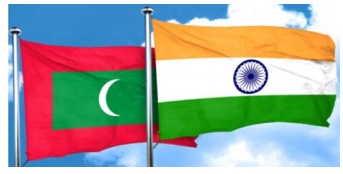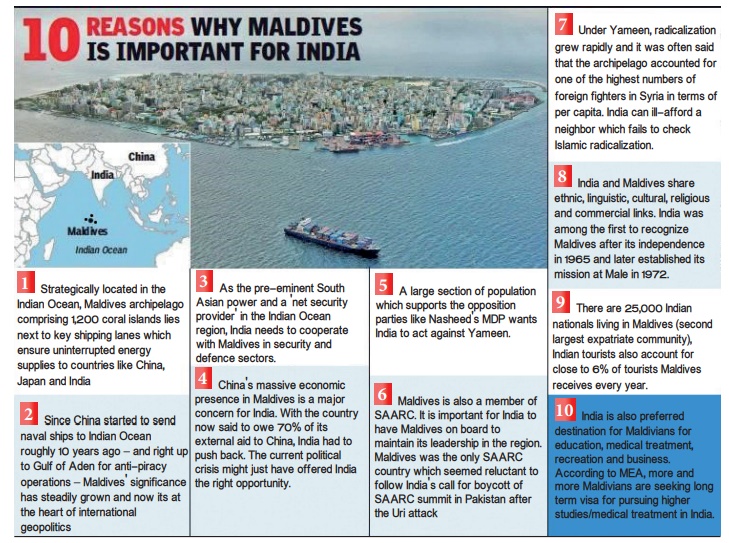Chapter: 12th Political Science : Chapter 10 : India and It’s Neighbours
India - Maldives Relations
India - Maldives Relations

The archipelago of Maldives consists of 1192
islands of which roughly 200 islands are inhabited with an estimated population
of 430,000 and 80 islands with tourist resorts. The capital Male is the hot
seat of Maldives’ power and is also the most populated Island. Being a
completely Sunni Muslim country with a liberal following, Islam is the only
state religion and practising of other religions are strictly private affairs
within the homes.
The first state level visit was in
1974 when Prime Minister Mr Ahmed Zaki of Maldives made an official visit to India.
India - Maldives formal relations began with the
declaration of Maldivian independence in November 1965. India was the first
country to recognise Maldives. After which there has been frequent visits by
the leaders of both countries. Most of these visits have benefited Maldives
economically.
This cordial relationship continued even during
President Nasheed tenure. President Nasheed’s maiden international trip after
coming to power was to India in 2008. During this visit, India promised a $100
million loan to improve the tourism industry in Maldives. Since then there have
been frequent visits by officials and President Nasheed to New Delhi until 2012
when President Nasheed was overthrown in a bloodless coup.

Maldives importance to India: Security
· Geostrategic Location: Maldives is located just 700 km from the strategic Lakshadweep island chain and 1,200 km from the Indian mainland, and the growing Chinese presence in the archipelago could have serious security implications.
· Indian
Ocean Region hegemony: Chinese heavy presence in Maldives would have given
China an opportunity and a base to influence and control the Indian Ocean
region. Also, the energy supplies coming from Gulf nations to India pass
through this area.
· Regional
imbalance: India enjoys
unparalleled access and influence in many of the Indian Ocean island
states, including the Maldives, Seychelles, and Mauritius which has been a
problem for China. China-Maldives bonhomie can act as a counter to Indian
influence in the region.

Economic relations
· Indian
expatriates: There are about
25,000 Indian expatriates in Maldives who are engaged in a number of
professional pursuits and their security is also of prime concern for India.
· Blue
economy:Maldives plays an integral role
in realising the potential of Indian Ocean blue economy as a contributor to the
security and sustainable development of sea resources.
· Tourism: India and
Maldives see regular tourist visits
between the two and Indian tourists also account for close to 6% of tourists
Maldives receives each year.
· Health: India is
a preferred destination for Maldives
citizens seeking health services, which boosts Indian healthcare sector.
Political relations
· Political
chaos: Uncertainty in Maldives could
prove a fertile breeding ground for extremism and religious fundamentalism,
smuggling and drug trafficking.Islamic State (IS) and Lashkar-e-Taiba are also reported
to have established bases in Maldives.
SAARC factor
· SAARC has a special importance for India because it
includes all of India’s neighbors but China. Of late, China has been creating
inroads into SAARC countries which is reducing India’s influence in the bloc,
for example Pakistan’s CPEC, China’s Hambantota port etc. and Maldives could be
China’s next destination.
Recent
development in India-Maldives relations: India and Maldives relations have seen many ups and downs
caused by changing political situations in both countries and some external
factors. During Maldivian Presidential elections in 2013 Abdulla Yameen defeated
Mohamed Nasheed to become the President. During Yameen’s term, Maldives
relations with India deteriorated while its closeness with China increased,
which is highlighted by:
· Cancellation of GMR project, 2012: Maldives
annulled the $500 million contract with GMR Group to develop a modern
International Airport near Male, which was given to a Chinese company.
· Cancellation of Indian PM’s trip, 2015:Due to turbulent
political situation in Maldives, Indian PM cancelled his trip to Maldives.
· China Maldives FTA, 2017: China and Maldives signed
an FTA, which is China’s second FTA with a South Asian country after Pakistan,
while there is no FTA between India and Maldives.
· Joint patrolling with Pakistan, 2018:During
Pakistan’s Army Chief’s visit, Maldives announced joint patrolling with Pak
Navy to guard Maldivian Exclusive Economic Zone, with an indirect reference to a
perceived threat from India.
During all these negative developments in Maldives,
India responded with patience and composure, trying to revive relations
diplomatically. However, the election of Solih,in 2018, as the new President of
Maldives has caused a thaw in India-Maldives relations which can be gauged by:
· Despite opposition from Indian Ocean Rim
Association, India convinced IORA Committee for Senior Officials in favour of
Male, following which Maldives was inducted as the newest member of IORA
recently.
· Maldives has asked India for a Dornier aircraft and
the MEA has responded positively to its request.
· Maldives’ new government has decided to pull out of
the free trade agreement (FTA) with China, realizing the one-sided nature of
the FTA.
Concerns between India and Maldives
· Chinese
inroads: Chinese infrastructure projects
in Maldives directly compete with Indian infrastructure companies’ business prospects.
· China
Maldives FTA: An FTA with China
would have raised the issue of diverting Chinese products into India through
Maldives. Maldivian government has not cleared its stand on future Chinese
investments yet and may continue to engage deeply with China.
· Low
bilateral trade: Bilateral trade
between both, which stands at US $200 million annually, is quite low.
India’s relations with Maldives began to improve with the Presidential elections in 2018. Ibrahim Solih’s electoral victory has opened a new chapter in the India – Maldives relations. Prime Minister Modi attended the Solih’s swearing-in ceremony and affirmed India’s commitment to peace and friendship with Maldives. The President of the Republic of Maldives, H.E. Mr Ibrahim Mohamed Solih, State Visit to India from 16-18 December 2018, keeping India first policy is yet another opportunity for both counties to come together for a closer relationship. As a step towards furthering closer relations between both countries, India promised $1.4 billion financial assistance package for socio-economic development of the island nation.
Way forward: Recent change in the attitude of
Maldivian government is an opportune moment for India to redraw bilateral
relations between both by helping Maldives to resuscitate its economy. Some
major area of confidence building are
· Investment cooperation with Maldives should be
enhanced by establishing an advisory cell to guide all stake-holders i.e.
Indian missions overseas and prospective Indian investors, to delineate touchy
areas and risky investments, with full knowledge of the local conditions.
· ‘Free-Purse’ policy of aid to Maldives is needed if
India wants to offset Chinese big-ticket investments in Maldives.
· India must enhance anti-terrorism cooperation and
intensify cooperation in the areas of training and capacity building of the
Maldives National Defense Force and the Maldives Police Service.
· A regular bilateral security dialogue amongst the
officials of both sides should be instituted to expand the scope of security cooperation.
This should be supplemented by Track-II and Track-1.5 dialogues.
· While dealing with smaller neighbors like Maldives,
India needs to become a lot more magnanimous, staying true to its own “Gujral
Doctrine,” thus creating greater confidence
· The SAARC and IORA can provide a platform to work
on lingering concerns. Moreover, India, Maldives and Sri Lanka can explore ways
to strengthen trilateral mechanisms to address these issues.
Related Topics